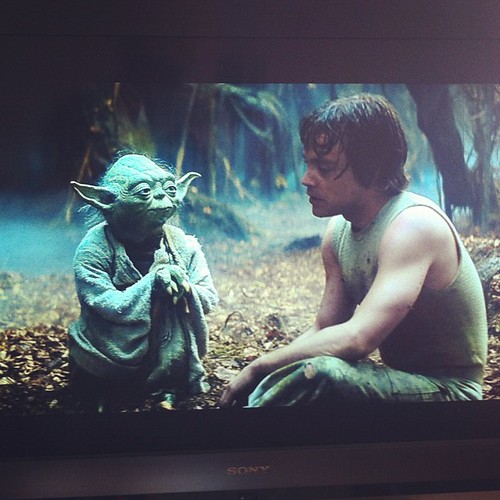 |
| Image by Blacren CC BY 2.0 |
Do, or do not.
There is no try.
I love that line. It sounds so truthy, and it's so quotable. It speaks of resolve, and determination, and not settling for less than your best. I think it's likely that teachers might be tempted to follow Master Yoda's lead and challenge their own students this way.
But I'm afraid that might be a mistake.
Have your students ever said something like, "I can't do long division!" or "I'm just not good at reading!" or "I don't understand algebra!" or "I don't know anything about chemical reactions!" (Have you ever made a statement like that?)
I think that it often is the case that we won't try things because we convince ourselves that we can't do them, we can't understand them. Maybe we don't even want to try?
This can be a very real problem for teachers working with students who seem unmotivated. How can we get kids beyond "I can't..." or "I'm not good at..." or "I don't know..." to a place where they will try? Much as I love Yoda, I think his admonishment "There is no try." is actually terrible advice for us! When you really reflect on what Yoda is teaching here, it's a pretty disheartening claim: "You only get one shot at this, and if you get it wrong, you're done." Now, that might be true if you're preparing to do battle with Darth Vader and save the galaxy, but most of the time the stakes aren't that high. If we put this kind of philosophy into practice in our classroom, it's no wonder that students would sink into an "I can't" mindset.
Carol Dweck is a professor of Psychology at Stanford University (check out her bio), and she is a big name in research on motivation, which has direct implications for teachers and students. I just came across this video of Carol talking about the power of adding the word "yet" to an "I can't" or "I don't know" statement.
So instead of There is No Try, maybe we need to change our perspective to Try, Try Again, and Again, and Keep Trying! If we can get our students to shift to "I don't know this...yet," what kind of difference would this make for their learning? I'm not so naive to think that every student would magically be transformed into a highly-motivated learning machine, but I think this would make a difference for many students!
What do you think?
I just tweeted out Carol Dweck's "yet" small speech yesterday, but get this - the DAY BEFORE I wrote "Do or do not. There is no try" on a sidewalk outside the conference center for ISTE13!! It was inspired by a session on "public poetry" (which I didn't even attend), and I didn't know any poetry! I'd always liked that phrase as well... Now you've got me thinking, of course... Thanks for posting, Dave!
ReplyDeleteI love that Yoda quote too, and it's hard for me to let go of it. But when I really think about what I'm aiming for in my teaching practice, I just don't think I can live out the philosophy it implies. Glad I could challenge your thinking, Joy. :-) We're all wading through this together...
DeleteI think the Yoda quote is being misunderstood. I take it to mean that if we are going to 'do' something, we should do it whole-heartedly. It doesn't mean that we will succeed. We can either give it a full effort or walk away; the half-hearted attempt is what I hear Yoda condemning.
ReplyDeleteI want my students to give it their best shot; I don't like my students just making a half-hearted attempt and then whining that they just can't. I always support, encourage, and work with them: the least they can do is work with me.
That's a fair point, Christian. I agree that we want students to put their full effort into their work, and not settle for a half-hearted attempt. I love your point about working *with* the students--that seems like a key aspect to me!
DeleteThanks for taking the time to respond!
Thanks for this post, Dave. At school I often hear the "I can'ts"...and it is just such a reflection of an individual's attitude. Yes, great point, Christian. Yoda is wanting best effort, purposeful effort, might I even say Vocational effort being put forward...
DeleteI am really commenting because Dweck's Mindset is my next read...and I am really looking forward to it.
Again, thanks for posting. Paul
If you watch that scene, you will see and hear Luke is not confident at all. It is not going to be his best effort. I show the clip to my students and explain that Yoda wants to have Luke actually do his best, not only say something he wants his teacher to hear. In the end Luke did try his best, and Yoda used this formative assessment of his powers to tell him his training wasn't finished as he flew off. My Father's alma mater, Norwich, had the slogan "I Will Try" when he attended, not a whiny "alllright...I'll try...".
ReplyDeleteSo, do or do not try. That's what I get out of Yoda.
That's fair! In fact, I totally agree with you about the context of Yoda's advice to Luke. The trouble is, most folks don't take the time to do what you have done, and show this full context and how whiny Luke actually is.
DeleteKudos!